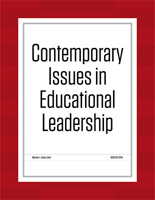Department of Educational Administration

Contemporary Issues in Educational Leadership
Date of this Version
5-28-2019
Document Type
Article
Citation
Contemporary Issues in Educational Leadership, 4:1 (2019)
doi 10.32873/unl.dc.ciel.1010
Abstract
My educational interests have largely been informed by my career in the sciences and medicine. My professional education has been both formative and transformative, opening doors to the joy of learning and a realization in the importance of memory. As an educator, clinician, and student, I have been greatly impacted by issues of curricular design, curricular development, learning and memory. My current responsibilities in student affairs also have exposed me to the delicate balance between student development, curricular design, learning and memory. Patton, Renn, Guido, and Quaye (2016) noted the importance of educators being able to use different literature sources and concepts in their daily interactions with students. In addition, Patton et al. (2016) further emphasized the importance of literature in guiding professionals in the development of curricular and related policy changes. Underpinning student development issues is the notion that the goals of education are ultimately tied to memory and learning. Atkinson and Shiffrin (2016) noted that “it is hard to imagine how understanding memory could not be important….memory is what we are, and what defines us as individuals” (p. 115). Atkinson and Shiffrin (2016) further noted how our memory system is divided into structural components and processing components that work together to create a retrievable memory. This simple fact has played out in my professional life as I have provided care for patients with dementia or other memory destroying processes; witnessing the person, father, mother, brother, sister, son, daughter, and friend literally become unrecognizable cognitively. In higher education we understand that learning and memory are symbiotic but not synonymous. Illeris (2018) noted that learning can be defined broadly as any process that leads to “change” and is not solely related to maturation or aging (p. 7). In higher education however, we are more interested in managing student education through the manipulation of learning acquisition and student-environment interactions (Illeris, 2018). Memory is an ill-defined event, which happens in our brain, and is impacted by many external factors (Roediger & Wertsch, 2008). In this paper I will explore issues of student development, human learning, human memory, and how these concepts should inform higher education’s approach to curricular issues and design. I will explore unique learning and memory concepts to provide a better understanding of the many facets of memory and learning. Additionally, I will survey ideas on curricular design that could incorporate important learning and memory concepts.
Included in
Educational Administration and Supervision Commons, Educational Leadership Commons, Educational Psychology Commons, Other Education Commons, Other Mental and Social Health Commons, Psychological Phenomena and Processes Commons, School Psychology Commons


Comments
Copyright © 2019 Alan R. Erickson